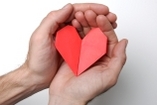Interview with
Dano Monkotowich, Jerusalem Branch Coordinator
 From Dano I learned a new definition for the term “alternative medicine.”
From Dano I learned a new definition for the term “alternative medicine.”
“Patients and their families appreciate what our work does only after we are not on the scene anymore. A worried family member sits next to his loved one’s room in the hospital chewing at his nails or hunting for an outlet where he can charge his cell phone. He’s nervous, concerned, frightened.
Suddenly an Ezer Mizion volunteer passes by with his refreshments cart and offers him a Danish pastry. The fellow thanks him with a blank expression, opens the wrapper, and eats the cake. The volunteer has already continued on his way. He is already on the next floor, in a different ward. Meanwhile, downstairs, the person pulls off half of the pastry and gives it to his sick relative. They finish munching, flick away the crumbs, and suddenly grasp what ‘alternative medicine’ is.”
Dano is right. It’s not the Danish. It’s the secret ingredient. The compassionate smile. The pat on the shoulder. The sympathetic words of encouragement. It’s the giver, even more than what is given. You are sitting there in the oncology ward at your low point. You have forgotten that you didn’t put a thing in your mouth the entire day. It is not even ‘alternative medicine’. It is medicine itself and without the pain that often comes with medical treatment. Plain and simple. Both the patient and the family member feel so much better. Someone noticed them as a person- not a vein to jab or a form to fill out. Someone understands what they are going through. Someone cares. 
Every day, Ezer Mizion’s Lottie’s Kitchen volunteers walk through hospital wards on regular routes at set hours and distribute their alternative medicine- pastries, hot meals, sandwiches, and drinks- to patients and their families. The ‘treatment’ affects not only the patient and family member but also the Lottie’s Kitchen volunteer. “It feels good to give,” they all say once they have tasted the experience.
“A few years ago,” Dano says, “we launched a project to recruit volunteers, with an interesting theme: Couples. The couples, usually parents of children, took upon themselves one or more volunteer rounds a week. They walk or drive to the hospital, load the meals onto the wagon, and go through the wards to distribute them. What were the results? Patients and their families whose pain was lessened, a greatly strengthened volunteer network, and, as a bonus: greatly enhanced matrimony. There is something about this joint work of doing chessed for others that does wonders for their marriage. I am willing to wager that on their way home, the couple has already forgotten all about the fights they had that afternoon and the entire week before.”
You know what I found most interesting in this whole story? Think about it. When someone you know has to be in the hospital, chas v’shalom and suddenly an energetic young man or woman sporting an Ezer Mizion shirt comes over and offers you a sandwich, does it seem strange to you? Unexpected? No, not at all. You know why? Because Ezer Mizion has become synonymous with giving. We have grown accustomed to it. And as far as I’m concerned, this pleasant routine, this naturalness with which we accept the Ezer Mizion giving– that is the biggest story of all. 
